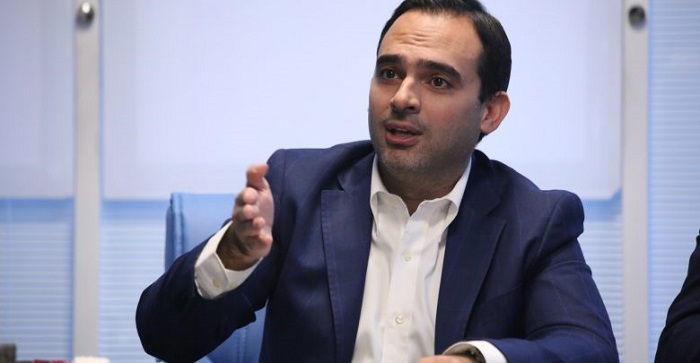He also emphasizes that bigger problems must be solved so that the formation of this union can be considered a promising issue for the technological ecosystem of the country
According to the IDEA, The CEO of Tapsi believes that the formation of a union called the Middle East Digital Cooperation Union is a good proposal, but he emphasizes that this proposal is not effective in the current situation. He believes that Iranian companies do not have much chance of success outside of Iran due to various conditions.
He also emphasizes that bigger problems must be solved so that the formation of this union can be considered a promising issue for the technological ecosystem of the country.
“Milad Monshipour”, the plan to form a specialized regional union named “Middle East Digital Cooperation Union” was proposed in the country’s startup ecosystem a while ago. As “Shahab Javanmardi” the CEO of Fanap announced, the Tehran Chamber of Commerce is trying to form this union. This issue has supporters and critics, and the CEO of one of the country’s largest startup companies believes that creating such a union cannot be very practical in the current situation.
“Milad Monshipour” declared that there is a misconception in the society that Iran is a powerful country in the Middle East and said: “With the mentality we have of the Middle East, we always feel very good about ourselves and we think that we are the strongest country in the Middle East, but the reality is It is that today the countries of the Middle East are only one point in terms of geography, but they are not similar to each other and form a very wide spectrum.
If I want to say very simply, in the Middle East, in the digital industry, we have countries that are at the level of advanced countries in the world, such as the UAE, and we also have countries that are very backward in this field, such as Afghanistan. So this geographical division does not necessarily have a special meaning anymore, but it is the same in Europe as well.
Monshipour believes that every independent country, regardless of its presence in the Middle East, has a special place for itself in the world. But he emphasizes that there should be a correct definition of the Middle East: “The Middle East has a wide spectrum, if we say the Middle East and we mean places like the Emirates and Dubai or even to some extent Qatar, it is a different matter than when we mean the Middle East of Iraq, Syria and Afghanistan Is. So defining where we are talking about in the Middle East is an important issue.”
In response to the question whether we as Iranian businesses are competitive in the Middle East or not? He said to:
“Competitiveness also depends on where we are going to work in the Middle East. If we want to enter and work in weaker countries, it will naturally be in places like Iraq, Syria and Afghanistan, which have their own set of requirements. We are competitive here, but in the field of these countries, the political and security discussions will be very heavy.
It can take a series of actions specifically in the political and security debate. The next topic of discussion is whether these countries have the necessary infrastructure or not. Of course, we must also keep in mind that the income of these countries is very low because their economy is weak, and we must see how cooperation in the digital field can contribute to our development.
But if we are talking about more advanced countries such as the UAE and Turkey or Saudi Arabia, the competitiveness of the businesses that exist in Iran is seriously questioned here. Competitiveness comes from two areas; either from the area of managerial capacity and capability or from the technical point of view; Both the technical infrastructure and the technical field experts.“
Monshipour believes that Iranian companies are very weak in terms of our management: “In other words, the strongest senior managers and CEOs that we have in our own country are not comparable and competitive with the managers of these countries, and we are very far away.
So, from the point of view of management, we definitely have a weakness because we have been in a closed environment for years and our managers could not learn what the management of a world level is and what are its requirements.
On the other hand, the CEO of Tapsi emphasizes that Iran has a good competitive advantage from a technical point of view: “We cannot transfer the technical infrastructure due to sanctions issues, but our technical experts are strong and the salaries are also different in our country. Here, the question that arises is whether this technical capacity can be used abroad or not.
In response to the question, what is the effect of sanctions on the formation of such alliances and cooperation? He called the sanctions very strict and emphasized that this issue is clearly more in the Middle East because these countries are subjected to additional strictness: “Practically, the sanctions prevent any financial transfers to Iran.
So, if an Iranian company develops itself in one of the Middle East countries, it is as if it is completely separated from Iran and cannot use the infrastructure it has in Iran. Or if it can, it will be in a very traditional way, such as transferring money with a suitcase and other very ineffective methods.
So, it is not at all similar to the fact that, for example, a company is formed in Finland and wants to develop itself in other countries of the world. The fact is that the sanctions are preventing and until the sanctions are not lifted, there is practically no hope for the expansion of Iranian companies.”
Monshipour by raising the question that how receptive should the countries be to us? He announced: “This section is about the ease of our companies’ work in these countries, which is again intertwined with the discussion of sanctions.” The countries of the region are not receptive and do not welcome Iranian companies.
This means that even individuals or companies have problems opening accounts (I am talking about the advanced countries of the Middle East, such as the UAE, Saudi Arabia, and to some extent Turkey), and in the same way, the more advanced the country is and the closer it is to the world, the stricter it is towards Iran.
This means that when a company wants to open a bank account in the UAE, it cannot do so with Iranian partners, and a basic task such as opening an account, which may be done for a non-Iranian company by a bank teller within an hour, for An Iranian company may become possible within a month or two with the involvement of the senior managers of that company, and then it will be difficult to transfer money to this account, and then any kind of strict KYC operation, etc… This is only one angle, which is the financial issue.”
In the end, the CEO of Tapsi believes that Iranian companies outside of Iran, whether it is the Middle East or elsewhere, do not have much chance: “In this situation, where can the formation of this union help? The fact is that, as I said, if it is Syria, Iraq, and Afghanistan, it can help from the political-security point of view, but in other countries of the region, probably due to the conditions I explained, the union cannot open an effective path and help.”




No Comment! Be the first one.